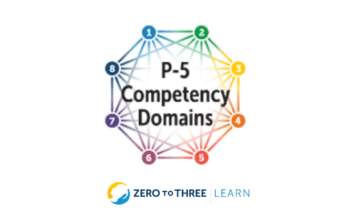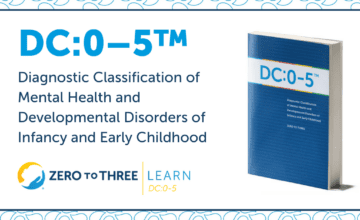IECMH Training Suite
Invigorate practices that promote emotional heath of infants and young children

The field of infant and early childhood mental health (IECMH) is relatively new, having its roots in the early 20th century and continuing to build and expand through a growing body of empirical evidence and clinical practice. ZERO TO THREE provides a flexible menu of training options to help clinicians and allied early childhood professionals build their capacity in key areas and stay current on essential child development and practice issues.
Training Descriptions:
Contact us to learn more about the following trainings, technical assistance services and options for customized packages that meet your specific needs. IECMH trainings are available in overview webinars and in-depth events delivered virtually or in-person on the following topics:
- Foundations and Theoretical Perspectives in IECMH: Explore a wide range of areas from the historical foundations of IECMH, importance of attachment, building relationships, and responsive caregiving, as well as disorders that can disrupt these processes. Gain a better understanding of the mental health needs of infants, toddlers, and young children and their families, and strategies for supporting them.
- Neuro-Relational Development: A child’s brain undergoes an amazing period of development from birth to three—producing more than a million neural connections each second. Join us for a focus on how brain development occurs within the context of relationships in infancy and early childhood.
- Reflective Supervision and Consultation (RS/C): The goal of RS/C is to provide support for professionals that demonstrates the ways in which they, too, can create more effective and supportive relationships with families. Explore the important components of RS/C, learn key skills associated with RS/C, and explore opportunities to integrate RS/C into your scope of work.
- Infant and Early Childhood Development: Gain a fundamental understanding of infant and early childhood development from birth through 5 years old. Become familiar with how development unfolds and recognize milestones of typical development and indicators of developmental delays or possible disorders.
- The Psychology of Pregnancy and Early Parenthood: Focus on the transition from the imagined child and the imagined parent to the actual baby and development of the parental identity. Gain an overview of the psychology of pregnancy including key concepts around development, identity, and issues surrounding complicated pregnancies, prematurity, and loss.
- Supporting Children and Families around Developmental Disorders/Disabilities: The arrival of a baby whose development, physical or cognitive capacities are delayed or reflect disability can have significant impact on the family. Review ways to identify developmental disorders and disabilities, provide early intervention, and foster family support and competence.
- Creating a Culture of Care in Infant and Early Childhood Mental Health: Children who have had early traumatic experiences come into our lives and programs with a variety of developmental needs. Professionals must understand the specific needs of the children and families they work with to build in appropriate and effective strategies and supports. Explore interventions which incorporate the lens of trauma or chronic/toxic stress to achieve trauma-informed practice.
- Observation and Assessment in Infancy/Toddlerhood: Understanding infants and young children is largely based on our ability to observe their behaviors, interactions, and development. Build awareness of recommended approaches to using formal and informal observations, screening, and developmental or psychological assessment to enhance understanding of the child and interventions with the child and their family.
- Clinical Formulation and Relationship-Based Interventions: Clinical formulation is the basis of intervening to support the mental health and development of young children and their families. The process supports the understanding of the young child’s clinical presentation in the context of their relationships, biology, social environments, developmental competence, and cultural context. Explore how IECMH clinicians arrive at clinical formulation needed for treatment planning and some current relationship-based interventions that are evidence-based.
- Systems and Public Health Approach to IECMH: Early childhood systems are multidisciplinary; mental health clinicians often need to interface with a variety of service systems surrounding the lives of infants/young children and their family. Explore ways to promote coordination and IECMH-informed policy and systems approaches. Learn about the public health approach to IECMH which focuses on the continuum of promotion, prevention, and intervention.

About the P-5 Competencies

The Growing Brain: From Birth to 5 Years Old, A Training Curriculum for Early Childhood Professionals
Connect With IECMH Professionals at Our Next Conference
Don't miss the next LEARN Conference where early childhood professionals from across disciplines, geographies and backgrounds will come together to strengthen their practice.


